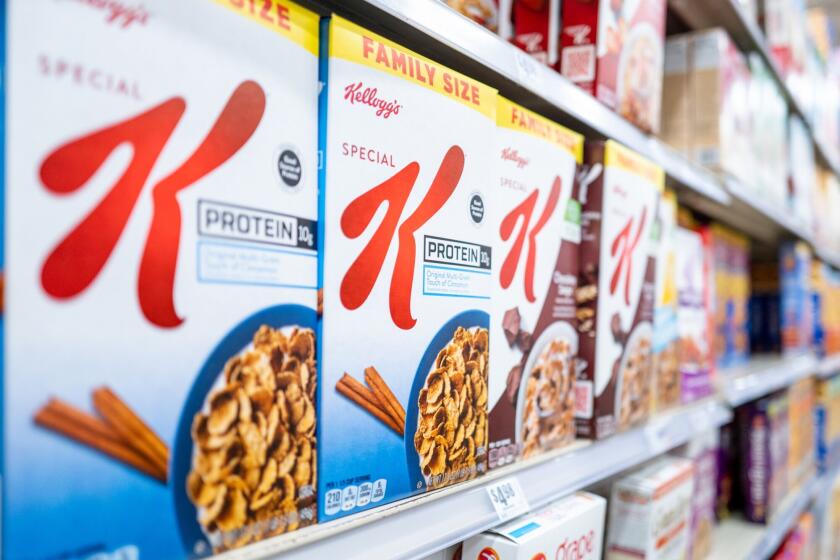Former G M Plant to Be Demolished for Business Park
- Share via
SOUTH GATE — Demolition of the former General Motors assembly plant will begin in April to make way for an $80-million retail and industrial center that will create 3,000 jobs, city officials said this week.
The construction of the South Gate Business/Industrial Park will bring about a “renaissance in the community,” said Mayor Bill De Witt, noting that the city was economically devastated in 1982 when the G M plant--then the city’s largest employer--closed, with a loss of 4,300 jobs.
Symbolic Check Presented
De Witt made the comments at a press conference held Tuesday in front of the 49-year-old G M plant, which the city sold to Goldrich & Kest Industries of Culver City and Sheldon Appel Co. of Santa Monica for $12 million. The two firms presented the city with a giant-sized symbolic check for the purchase price. The two firms have already paid the city $4 million and signed a note to pay the remaining $8 million after plant demolition is completed in 1987, City Attorney Bruce Boogaard said.
Also involved in the project is the East Los Angeles Community Union, known as Telacu. The business will purchase and develop an 18-acre industrial park on the plant’s 88-acre site for about $2.5 million, city officials said. They added that Telacu will pay $2.5 million to the new owners for the property.
After the plant is demolished, work on the 1.5-million-square-foot complex will begin in March, 1987. The project is supposed to be completed in phases by 1997, Appel said Tuesday. Plans call for industrial, light manufacturing and retail distribution facilities, and a 13-acre shopping center.
In an interview, David Lizarraga, Telacu president, promised an “attractive, upscale, well-maintained and secured development” that will be similar to Telacu Center in Commerce, another industrial park.
Under the agreement, approved last month by G M officials, the plant was sold to the city for a bargain price of $7 million, with the city reselling the plant to Goldrich & Kest and Sheldon Appel Co. for $12 million. Included in the $12-million price was $5 million for demolishing the plant, to be done by a contractor hired by G M, city officials said.
G M originally listed the 90-acre plant for $32 million but later offered the plant to the city for $15 million. The city, however, could only find a buyer willing to pay $12 million, including the cost of demolishing the plant. G M could have received a higher price for the plant by selling it for warehouses, said Matt Cullen, a real estate administrator for Argonaut Realty, a division of G M. Cullen, however, said city officials were opposed to warehouses because, they said, no jobs would be created.
While G M made a “substantial concession” to the city on the sale price, the auto maker did receive a federal tax break, Cullen said. Last December, the corporation wrote off as a charitable contribution the $25 million difference between the plant’s appraised value of $32 million and the $7 million sale price to the city, Cullen and Boogaard said.
‘Good for the City’
In his remarks, De Witt praised G M’s cooperation, saying, “They could have just let it (the plant) sit on the market and rot for a number of years.”
While other city officials praised the project, Councilman Hank Gonzalez, an assistant regional director for the United Auto Workers, said he had mixed feelings about the plant’s demise.
“It’ll be good for the city, but I just hate to see the plant go down,” said Gonzalez, who worked at the facility for 12 years, beginning as a spray paint operator in 1955.
“I have a lot of memories here,” Gonzalez said.
The G M plant, on Tweedy Boulevard, opened in 1936 and was the company’s first assembly facility west of the Mississippi. Except during World War II, when the plant was used to build Army tanks, it cranked out Buicks, Oldsmobiles and Pontiacs almost without interruption until the oil crisis of the 1970s. The plant was closed after a sales slump in 1982, caused in part by competition from foreign auto makers.
More to Read
Inside the business of entertainment
The Wide Shot brings you news, analysis and insights on everything from streaming wars to production — and what it all means for the future.
You may occasionally receive promotional content from the Los Angeles Times.










